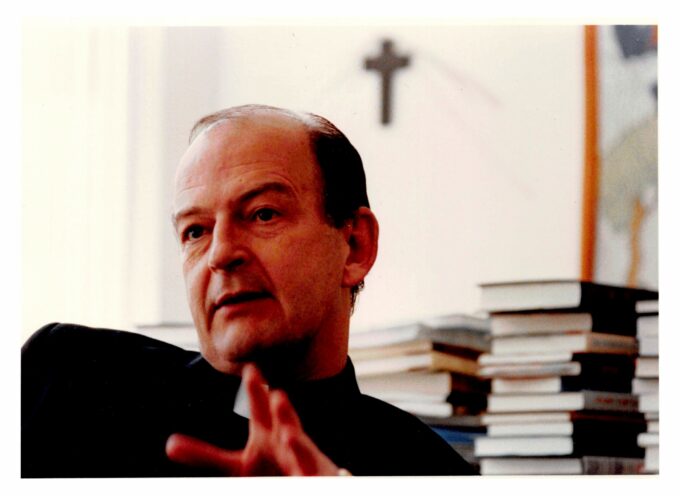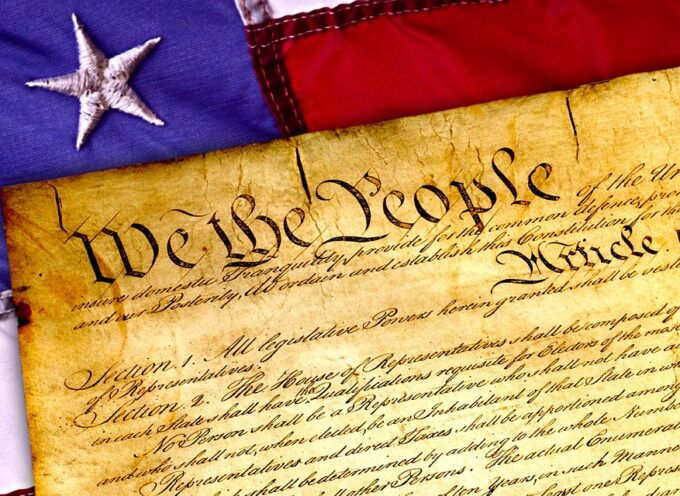As a political opinion writer, I am generally amused by many of the critical comments people leave on my website or my Fox News Opinion pieces; sometimes I am amused because the comments are insults, other times because they are patently inane.
Yet, other times, the critical comments should be taken seriously because the commenter intends them seriously; one of the most serious and recurrent criticisms is that, “Christians should not be involved in politics and public life at all. Jesus wasn’t political, and he never asked us to be political.” In effect, they are saying “Withdraw from politics and public life.”
So, was Jesus “political” during his time on earth?
In certain contemporary American senses of the world “political,” no he was not. He never took out newspaper ads telling the folks in Nazareth to “vote for option C in the sewage referendum.” He was not a government official and never ran for public office. He never spent his free time on Facebook yelling at people from the other side of the political aisle, employing a generous use of the CAPS LOCK and !!!!!!!!!! keys to make his points.
But in a deeper sense, Jesus’ ministry was profoundly, thoroughly, and inescapably political. Here are three proofs of the political nature of his ministry:
-
Jesus’ last name was not “Christ.”
Jesus’ last name was not “Christ.” In other words, when he went to the doctor’s office and the nice lady at the window asked his name, he did not reply, “first name ‘Jesus,’ last name ‘Christ.’” Christ is not a last name but a title, a Greek word referring to the long-awaited Jewish Messiah, whose salvation had not only personal, but social, cultural, and political connotations.
The Roman Empire formed the context of Jesus’ ministry. Like Egypt, Babylon, and Persia, the Roman Empire offended the Jews not only by publicly worshiping idols, but by being a constant reminder to the Jews of their own unfaithfulness to God. This sort of frustration led the Jews to long for the promised Messiah who would restore them from exile; the long-awaited Messiah would act decisively on their behalf, and he would do it politically.
So when Jesus declared that God’s kingdom was at hand (Matthew 3:2), his audience heard him loudly and clearly: a political kingdom was on the rise. Nobody imagined that Jesus envisioned an a-political series of radio devotionals or tent revival meetings. Biblical scholar N. T. Wright describes the situation well:
Jesus’ message was after all inescapably political. He denounced rulers, real and self-appointed. He spoke of good news for the poor. He led large groups of people off into the wilderness, a sure sign of revolutionary intent. He announced the imminent destruction of the Jerusalem temple. At the start of a festival celebrating Israel’s liberation, he organized around himself what could only have looked like a royal procession. And he deliberately and dramatically acted out a parable of the temple’s destruction, thus drawing on to himself the anger of the authorities in a way which he could never have done by healing lepers and forgiving prostitutes (though we should not miss the revolutionary note in his offer of forgiveness, whose real offence lay in its bypassing of the temple cult). . . . He died the death of the lestai, the political insurrectionists (Barabbas, and the two crucified with Jesus, were lestai). How could he not have been ‘political’?
One reason contemporary readers might miss the patently political aspect of Jesus’ kingdom is that, during his first coming, he intentionally avoided military might and traditional avenues of power. But make no mistake: when Jesus demonstrated time and again that he was Lord, and when the early church declared “Jesus is Lord!” the net effect was to declare that Jesus was Lord and the Roman Caesar was not. It doesn’t get any more political than that.
-
Jesus promised he would institute a one-world government and a one-party system.
When Jesus preached his gospel of the “kingdom,” he was saying that he would return one day to institute a one-world government and a one-party system, with him as the supreme ruler. The book of Revelation depicts this kingdom as one that is characterized by justice, love, and peace; in which worshipers from every tribe, tongue, and nation will worship him (Rev 5:8-9) from a capital city called the New Jerusalem (Rev 21:2), in which there will be no more pain and no more tears (Rev 21:4-5).
What, then, are we to think of Jesus’ statement to Pilate that Jesus’ kingdom was “not of this world” (John 18:36)? Should we think that he means his kingdom will be located “up and away from the earth” in some sort of ethereal never-never land? No. In fact, his kingdom will be a renewal and restoration of this cosmos. Should we think of his kingdom as being located in the inner recesses of people’s hearts? No. His kingdom is holistic encompassing both the spiritual and material, both the private and public, aspects of our lives.
What Jesus meant when he said that his kingdom was “not of this world” is that it would not be characterized by sin or by sin’s consequences. Unlike today’s kingdoms, it would be characterized by love rather than self-love, justice rather than injustice, peace rather than war.
Another oft-misinterpreted statement of Jesus’ regards the famous dictum of rendering to Caesar what is Caesar’s, and to God what is God’s (Mark 12:13–17). Does this mean that our lives are divided into two realms, in which we let the government have supreme rule over the public aspects of our life, while we let Jesus rule over the private aspects? Absolutely not. It means the opposite. It means Caesar’s role is limited, but Jesus’ is not. He is saying something to the effect of, “Look at this coin. It’s got Caesar’s face on it. Fine, he can have it. Pay your taxes. Be a good citizen. But never give him your ultimate allegiance. That belongs to God alone.”
-
Jesus’ suffering teaches us how to be political in this era before he returns.
But, somebody might object, “Jesus was crucified; and if you are right that his ministry was political, doesn’t that mean that he failed in his political aims?” This is a good question, and the answer is “no.” The worldly powers crucified Jesus because they didn’t want a Messiah who would disrupt their rule. And Jesus willingly gave himself to be crucified so that he could save us from our sins and for a life as ambassadors of his kingdom (2 Cor. 5:20). We remain his ambassadors to a lost world until the time he returns to consummate his kingdom.
But not only did he die to make us ambassadors of his kingdom; he suffered to show us how to be ambassadors of his kingdom. This cross-shaped pattern of witness is immediately relevant to Christians who find themselves being disempowered and decentered socially, culturally, and politically in the midst of the American Empire. As painful as this decentering has been, we should embrace the moment. We should accept the challenge to serve our nation from a position of weakness.
After all, our Lord reigns from a tree. His first coming did not take the form of an ascendant political movement to subvert the reigning powers and replace them with better rulers. Instead, it took the form of a humiliating and painful witness, even in defeat. In fact, when the risen Jesus said to the apostles, “As the Father sent me, so I send you,” he held out his hands and side to them, affirming that their public witness would also be cruciform.
A cross-shaped political witness will be prophetic; just as Jesus declared that he is Lord and Caesar is not, so we must challenge the cultus publicus of the American Empire. A cross-shaped political witness will be sacrificial; just as Jesus ministered as a homeless itinerant teacher, we must be willing to serve our nation from a position of weakness rather than power, and in the face of disapproval instead of applause. A cross-shaped political witness will be humbly confident; as dark as our political moment may seem, the realm of politics will one day be raised to life, made to bow in submission to the King. Since Jesus will gain victory and restore the earth, we remain confident. And since it will be his victory, we remain humble.
When he returns victorious, American Christians will meet him first and foremost as Christians. But we will also meet him as Americans. Being American is not the most important aspect of our identity, but it is an inescapable aspect and one for which we will give account. For that reason, we owe it to our nation to follow the way of the cross, to minister from a tree just as our Lord now reigns from a tree and only later will reign visibly from a throne.
Subscribe
Never miss a post! Have all new posts delivered straight to your inbox.








Thank you for sharing your wisdom.
As a missionary in the Philippines, I’m constantly torn between speaking out against the wicked, murderous regime in power, & holding my tongue to keep from being deported.
Please pray for me about this.
John, thank you for interacting. You’re in a tough situation. Here’s a further thought: the missionary work you are doing is in and of itself “political” in the best sense of that word, because that work itself declares that Jesus is Lord, and it gives the world a preview of our Lord’s coming Kingdom.
Ummmm…. I’m not so sure it’s a good idea to describe Jesus’ teachings and life as political. As you point out, Jesus’ teachings and life certainly spoke to and challenged the governing system of the day. If that is “political” than yes, Jesus can be said to be political.
I would argue, however, that what is overlooked (and dangerous) in that description is that it misses Jesus’ own understanding of his work. He defined the problems of the day (poverty, injustice, etc.) not as political problems, but as spiritual ones. Pride, greed, false loves, disobedience, hypocrisy were what he focused on as the problems of the day. The symptom was the political realm with its violence and injustice.
The answers jesus provided therefore, were likewise spiritual. These are well described in the piece: Forgiveness, humility, resistance to Caesar’s claims of uberauthority, sacrificial living, among them. They are radical concepts in the literal sense; they go “to the center” and send shockwaves outward, shaking the kingdoms of this world, until they come into submission or fall. His use of political imagery (as N.T. Wright documents) leaves no doubt that he intended the same. It points NOT to a rival politic but an authentic and central one.
American Christians, I fear, have largely not understood. They have either sought to shield the culture from the implications of Jesus teaching to our government OR to simply join with it as a partial “answer” to the symptoms.
Jim, thank you for taking the time to interact. I agree with some of what you say and you make some good points. But private and public cannot be separated, just as spiritual and political cannot. of course, we need to define what we mean when we say Jesus was political, but political he was. The Bible relates “religion” to the “heart” more than 800 times. So true religion is located in the innermost recesses of who we are. It is deeply personal. But it is not private. Precisely because it is personal, and because it involves our whole-life allegiance, it radiates outward into everything we do socially, culturally, and politically. So Jesus and we are political, but we are political in Christian ways, ways shaped by God’s creational design and Christ’s suffering. That would include many of the things you mention, such as forgiveness, humility, sacrificial living.
You are redefining the word Political to fit your narrative. Jesus was not political, he did not need to be as the King of the Universe. Only those seeking power within a country or a group of people can be defined as Political. Jesus as God, does not need to compete for that title, it has always been his and it will always be his.
Amen Vincent Quiles. Agree 100%
Amen. Agree 100% with Vincent Quiles
Thank you, Jim.
“All humans become political when they involve themselves in the life of another. Jesus spent His time: modeling how to serve others; seeking God, The Father’s favor; in prayer; observing others in order to discover their needs; being obedient to God in spite of social regulations and practices. These are the ideas inherent in The Kingdom of Heaven.
We find them through thoughts and activities that propel our spirit outwards from our self. ”
Excerpt From: Mike Stair. “On Earth As It Is In Heaven.” iBooks. https://itun.es/us/DZeA8.l
Many think the church is no place for politics. I think that Rev 3:14 calls out our present day lazy, sleepy church so that Jesus is outside knocking to open the door. If the Laodicean way is not political what is it?
By its nature, Right Wing Conservative Christians do not believe in a Democracy. They clearly believe in a dictatorship called Theocracy. Believing in a Theocracy isn’t a problem within itself. It is a problem when Christians impose their Theocracy beliefs upon a Democratic society. Instead of praying for Thy Kingdom come. Thy will be done, on Earth as it is in Heaven, and setting an example as to what God’s Kingdom looks like through their daily lives, Right Wing Christians try to usurp Democracy through legislating their beliefs upon society. This is their version of Islamic Sharia Law.
Example; right wing “political Christians” are trying to legislate through politicians and changes in the Supreme Court strict anti-abortions laws. If accomplished, imagine a woman going through the terrible decision of possibly having an abortion and then being faced with police arresting her, being thrown in jail, and handed over to a worldly court system facing judgement. Is that the love of Jesus? No, instead of experiencing the love of Christ reaching out to her through believers in attempts to change her mind she will be facing sentencing by the hands of a cruel world system.
This attempt by Right Wing Christians is not the love of Jesus that is found in the New Testament. This is similar in many respects to when the Scribes and Pharisees brought a woman who had been caught in adultery before Jesus and demanding that she get stoned to death according to the Law. What did Jesus say to them? Jesus showed and exhibited a totally different approach to sin than the Pharisees, Scribes, and today’s Right Wing Christians. Instead He offered an approach of love. He exhibited a glance of the New Testament Kingdom of God where mercy and truth are met together and righteousness and peace have kissed each other. All Christians should do the same.
Reject the Right Wing Christian’s version of Sharia Law and replace it with the love of Jesus.
And left wingers want to give permission to sin.
It can become a very slippery slope when the Christian church becomes very politically involved where big mistakes can be made that could eventually wrought shame to the church. Consider history. Politicians have USED the church for their corrupt purposes by offering Christians certain considerations in return for their support. History does repeat itself.
Example;
One of the reasons why Mussolini pushed the idea that women should stay at home and look after the family while their husbands worked, was because this was an idea pushed by the Roman Catholic Church. Mussolini voiced his disapproval at the use of contraception – an identical stance to the Roman Catholic Church. Like the Roman Catholic Church, Mussolini also wanted divorce banned in Italy. By doing all of this, Mussolini was trying to bring the Roman Catholic Church onto his side to get its support and give added credibility to his government.
Gods politics are not the worlds politics. They are separate matters. Gods justice is not the worlds justice. For example god warns us to settle our matters and not go to court. Politics of the world and god’s politics are two separate experiences. I think this is what people are trying to say ans you are missing the point. Jesus politics was gods politics NOT mans politics
I think you are taking huge liberties with your so called proofs. Christ is a title, the Messiah, the savior, not a political title at all. Jesus did speak of establishing a kingdom, not a partisan political statement whatsoever. A Kingdom implies a monarchy and as far as I know, you don’t vote between a number of Prince’s to elect a king. And finally, Jesus’ sacrifice was so that we did not have to pay for our sins and be saved without punishment, not sure how you can equate this sacrifice with a political statement at all. To all of you reading this piece I caution you of wolfs in sheep’s clothing. God gives us wisdom to discern information as it becomes available to us so that we are not fooled by Satan or his minions. Be smart and question everything weighing it always against the scriptures, which is the word of God. I am not saying we should not have a political opinion, but beware of those who site the bible to push a false narrative. The most direct opportunity for Christ to make a political statement was on the question of taxes, remember what he said? Give Cesar what belongs to Cesar and to God what belongs to God. This could not be a non-political answer. Walk in Peach and may the Lord bless you all.
Depends on how we define “politics.”
Traditional definitions of politics always refer to the state, the polity. And state politics are always based in force — by the power of the sword, the gun, by threat of incarceration. Politics = force.
But Jesus never used such force (sword, etc), hence he never engaged in the common definition of politics. His actions were spiritual.
It’s said that Jesus could have called down heaven (force), but did not. He refused political power, as commonly defined.
What you’re doing is shoehorning Jesus into a very different definition of politics. That’s fine, but it’s not a proper use of the word.
Jesus never concerned Himself with the political order of the day, nor with the Roman government and its laws. Instead, He came to preach that the Kingdom of heaven is at hand and that He is not of this world, but from above. He came to reconcile man back to the Father and to bring about salvation and redemption through His shed blood on the cross. He never spoke out against the Roman government authority but always distinguished and contrasted His Kingdom and His purpose for being born on earth. The reason why the apostate church is in such turmoil is because government politics has become a key focus. These churches have forgotten or created false doctrines regarding Yeshua (Jesus) ministry on earth. He never involved himself with politics. There is no scripture in the Bible that reveals His political involvement and the ones that clearly demonstrate Him speaking of His Kingdom as separate and apart from the kingdoms of this world e.g. conversation with Pilate, have been distorted to falsely support Jesus as having a political agenda
I thank you so much for your gadian with scripture